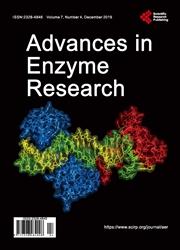Characterization of a Thermostable, Recombinant Carboxylesterase from the Hyperthermophilic Archaeon Metallosphaera sedula DSM5348
引用次数: 5
Abstract
Lipid-producing microalgae are emerging as the leading platform for producing alternative biofuels in response to diminishing petroleum reserves. Optimization of fatty acid production is required for efficient conversion of microalgal fatty acids into usable transportation fuels. Microbial lipases/esterases can be used to enhance fatty acid production because of their efficacy in catalyzing hydrolysis of esters into alcohols and fatty acids while minimizing the potential poisoning of catalysts needed in the biofuel production process. Although studies have extensively focused on lipases/esterases produced by mesophilic organisms, an understanding of lipases/esterases produced by thermophilic, acidic tolerant microbes, such as Metallosphaera sedula, is limited. In this work, the carboxylesterase from Metallosphaera sedula DSM5348 encoded by Msed_1072 was recombinantly expressed in Escherichia coli strain BL21 (λDE3). The purified enzyme either with a hexahistidine (His6)-tag (Msed_1072Nt and Msed_1072Ct) or without the hexahistidine (His6)-tag (Msed_1072) was biochemically characterized using a variety of substrates over a range of temperatures and pH and in the presence of metal ions, organic solvents, and detergents. In this study, the fusion of the protein with a hexahistidine (His6)-tag did not result in a change in substrate specificity, but the findings provide information on which enzyme variant can hydrolyze fatty acid esters in the presence of various chemicals, and this has important implication for their use in industrial processes. It also demonstrates that Metallosphaera sedula Msed_1072 can have application in microalgae-based biofuel production systems.超嗜热古菌Metallosphaera sedula DSM5348的耐热重组羧酸酯酶的研究
产脂微藻正在成为生产替代生物燃料的主要平台,以应对日益减少的石油储量。为了将微藻脂肪酸有效地转化为可用的运输燃料,需要优化脂肪酸的生产。微生物脂肪酶/酯酶可用于提高脂肪酸的产量,因为它们在催化酯水解成醇和脂肪酸方面具有功效,同时最大限度地减少了生物燃料生产过程中所需催化剂的潜在中毒。虽然研究广泛关注中温微生物产生的脂肪酶/酯酶,但对嗜热耐酸性微生物(如Metallosphaera seula)产生的脂肪酶/酯酶的了解有限。本研究将Msed_1072编码的sedula金属球孢(Metallosphaera seula) DSM5348羧酸酯酶在大肠杆菌BL21 (λDE3)中重组表达。纯化后的酶,无论是带六组氨酸(His6)标签(Msed_1072Nt和Msed_1072Ct)还是不带六组氨酸(His6)标签(Msed_1072),都在不同的温度和pH值下,在金属离子、有机溶剂和洗涤剂的存在下,使用各种底物进行生化表征。在这项研究中,该蛋白与六组氨酸(His6)标签的融合并没有导致底物特异性的变化,但研究结果提供了哪些酶变体可以在各种化学物质存在的情况下水解脂肪酸酯的信息,这对它们在工业过程中的应用具有重要意义。这也证明了金属藻Msed_1072在微藻生物燃料生产系统中具有应用价值。
本文章由计算机程序翻译,如有差异,请以英文原文为准。
求助全文
约1分钟内获得全文
求助全文

 求助内容:
求助内容: 应助结果提醒方式:
应助结果提醒方式:


